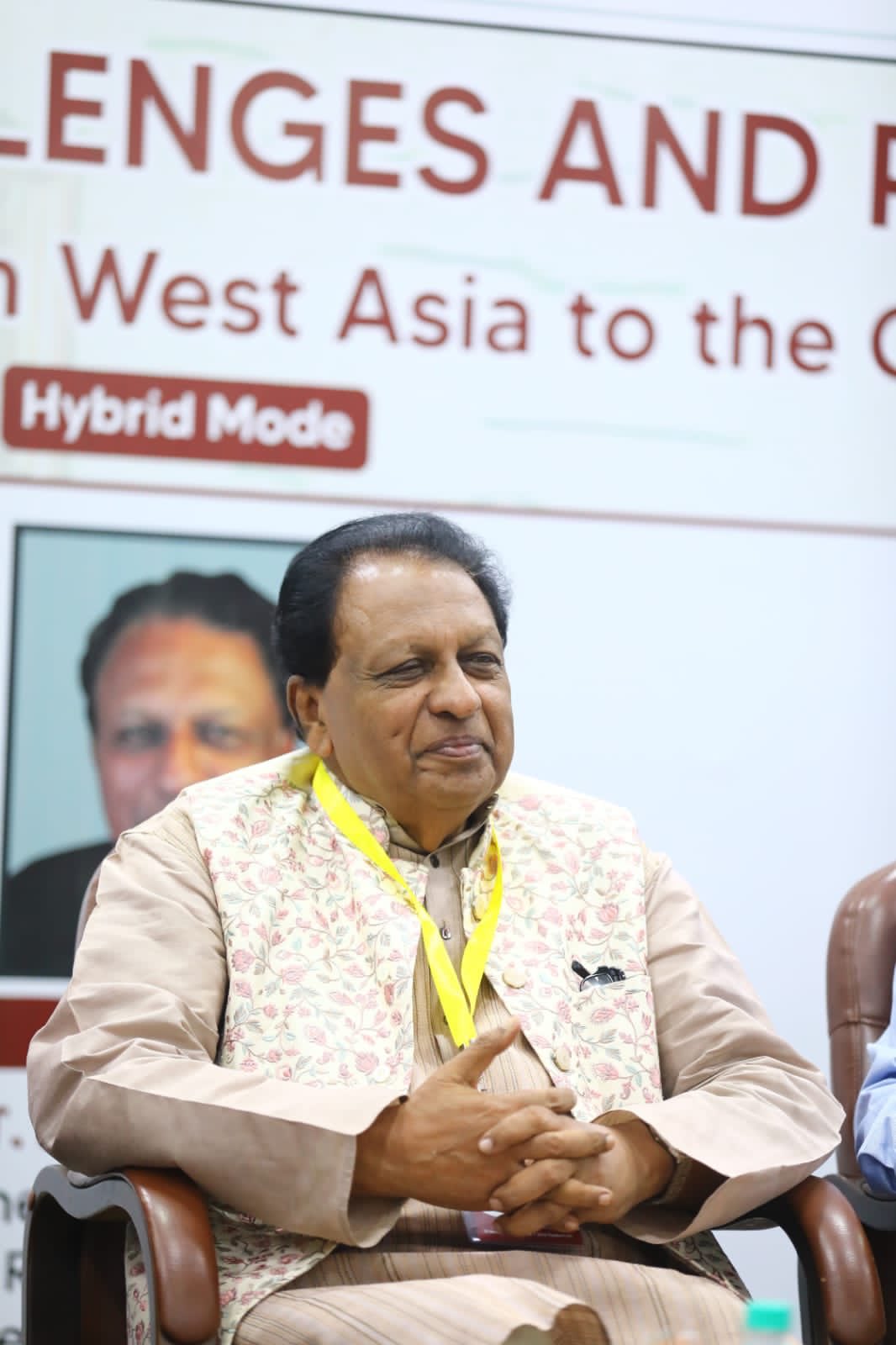असहज विश्व परिदृश्य और शांतिदूत की भूमिका में भारत
 भारत के प्रधानमंत्री मोदी ने जुलाई 2024 में मॉस्को में रूस के राष्ट्रपति व्लादिमीर पुतिन से मुलाकात की थी। / X@narendramodi
भारत के प्रधानमंत्री मोदी ने जुलाई 2024 में मॉस्को में रूस के राष्ट्रपति व्लादिमीर पुतिन से मुलाकात की थी। / X@narendramodi
-राजदूत (सेवानिवृत्त) टी.पी.श्रीनिवासन
वैश्विक मामलों के लिहाज से यह एक महत्वपूर्ण समय है जब द्वितीय विश्व युद्ध के बाद संयुक्त राष्ट्र को केंद्र में रखकर बनाई गई व्यवस्था लगभग अदृश्य हो गई है। आज संयुक्त राष्ट्र अंतरराष्ट्रीय शांति और सुरक्षा सुनिश्चित करने की स्थिति में नहीं है। सिर्फ इसलिए नहीं कि वीटो इसके द्वारा किसी भी प्रभावी कार्रवाई को रोकता है बल्कि इसलिए भी क्योंकि कुछ स्थायी सदस्यों ने अन्य सदस्य देशों के खिलाफ युद्ध छेड़कर अपने हितों को आगे बढ़ाने के लिए वीटो को हथियार बनाना शुरू कर दिया है। ऐसे में एक न्यायसंगत और वैकल्पिक वैश्विक व्यवस्था का निर्माण आज की दरकार है। भारत के प्रधानमंत्री नरेंद्र मोदी के नेतृत्व में भारत अपने लोगों के लिए समृद्धि सुनिश्चित करने के वास्ते संघर्ष करते हुए भी विकास, निरस्त्रीकरण और पर्यावरण के लिए अंतरराष्ट्रीय सहयोग को बढ़ावा देने के प्रयास में लगा हुआ है। विकास के लिए शांति एक पूर्व शर्त है, लेकिन आज की दुनिया विभिन्न क्षेत्रों में युद्धों से तबाह हो रही है।
गुटनिरपेक्ष आंदोलन दुनिया का सबसे बड़ा शांति आंदोलन था। यह अह भी ग्लोबल साउथ की जरूरतों को बढ़ावा देने में प्रासंगिकता रखता है। दुख की बात है कि यह विकासशील दुनिया है जो संघर्षों के कारण होने वाली पीड़ा का खामियाजा उठाती है, चाहे वे कहीं भी हों। प्रौद्योगिकी ने दुनिया को अधिक सुलभ बना दिया है और इसके नतीजों से विकासशील दुनिया को लाभ हुआ है, लेकिन इससे असमानता और दुरुपयोग के खतरे भी बढ़े हैं।
नई दिल्ली में जी 20 शिखर सम्मेलन ने अपनी सदस्यता बढ़ाकर और वीटो के डर के बिना सुरक्षा परिषद की तुलना में व्यापक भागीदारी के साथ गहन चर्चा के लिए मंचों को बढ़ाकर बहुपक्षवाद को विभिन्न तरीकों से पुनर्गठित किया। संपूर्ण अफ्रीकी संघ को जी 20 के सदस्य के रूप में शामिल किया गया था। यह एकमात्र अंतरराष्ट्रीय मंच था जो रूस-यूक्रेन युद्ध पर सर्वसम्मति से बयान देने की स्थिति में था। अंतरराष्ट्रीय समुदाय के लिए महत्व के कई और मुद्दों पर चर्चा की गई और उनमें से कई पर आम सहमति बनी। जी 20 जैसे समूह वैश्विक शांति में योगदान देने में सक्षम हो सकते हैं। खास तौर से तब जब सुरक्षा परिषद अपनी असंतोषजनक संरचना और निर्णय लेने के तंत्र के कारण अक्षम है।
जी-20 के दौरान ही भारत ने एक बार फिर अपनी शांति स्थापना की भूमिका फिर से शुरू की क्योंकि हमारी नीति रूस-यूक्रेन युद्ध के किसी भी पाले के साथ होने के बजाय शांति के पक्ष में होने की थी। रूस के साथ भारत के विरासती रिश्ते और यूरोपीय संघ के साथ उसके संबंधों ने इसे संघर्ष में एक पक्ष के बजाय शांति का दूत बना दिया है जबकि रूस इस बात से प्रसन्न था कि भारत ने इसकी निंदा नहीं की और दूसरे पक्ष को अहसास हुआ कि शांतिदूत के रूप में भारत की क्षमता उनके लिए उपयोगी हो सकती है।
हालांकि भारत मध्यस्थता के खिलाफ है और विवादों को सुलझाने के लिए द्विपक्षीय बातचीत को प्राथमिकता देता है लेकिन पीएम मोदी ने यह कोशिश करने का फैसला किया कि क्या आज दुनिया में उनकी अद्वितीय स्थिति समाधान को बढ़ावा देने में सक्षम होगी। वह इस प्रक्रिया में आने वाले खतरों से अनभिज्ञ नहीं थे, जब युद्धविराम भी नहीं हुआ था और दोनों पक्ष सैन्य जीत की उम्मीद कर रहे थे। मॉस्को की उनकी यात्रा उच्चतम स्तर पर पारंपरिक आदान-प्रदान की प्रकृति में थी। खासकर प्रधानमंत्री के रूप में तीसरा कार्यकाल जीतने के बाद। राष्ट्रपति पुतिन ने आतंकवाद के खिलाफ लड़ने के अलावा कुछ भी वादा नहीं किया और भारतीय यात्रा के समय कीव में बच्चों पर बमबारी बेहद दुर्भाग्यपूर्ण थी।
इसके बाद पीएम मोदी की यूक्रेन यात्रा सबसे अप्रत्याशित थी। जब यात्रा की खबर लीक हुई तो कई संदेह खड़े हुए। पीएम मोदी को यात्रा न करने की सलाह दी गई क्योंकि इसे अमेरिका और नाटो को खुश करने के रूप में देखा जा सकता था। साथ ही इस बात की भी कोई उम्मीद नहीं थी कि युद्धविराम भी हो सकेगा। जेलेंस्की ने यह स्पष्ट कर दिया था कि मिशन निरर्थक था और उन्होंने रूसी तेल के आयात और प्रतिबंधों को खत्म करने को चुनौती दी। उन्होंने स्पष्ट रूप से कहा कि वह चाहते हैं कि मित्र एक अस्पष्ट शांति पहल के पक्ष के बजाय आक्रामकता के शिकार के रूप में उनके पक्ष में हों। उन्होंने एक शांति सम्मेलन में भारतीय सक्रियता का सुझाव दिया, लेकिन तकनीकी कारणों से तुरंत भारत को अयोग्य घोषित कर दिया। आलिंगन और सांत्वना के शब्दों का उन पर कोई प्रभाव नहीं पड़ा क्योंकि वे दीवार की ओर पीठ करके लड़ रहे थे। वह किसी से सलाह के शब्दों के बजाय कुछ गोला-बारूद प्राप्त करना पसंद करते। ऐसे में पीएम मोदी ने स्थिति को बहुत अच्छी तरह समझा और अपने इस कदम के लिए अमेरिका और नाटो की सराहना स्वीकार की। परंपरागत रूप से हमने तब भी संयम की वकालत की है जब हम किसी संघर्ष के एक पक्ष को समर्थन देने की स्थिति के लिए प्रतिबद्ध थे। बुद्ध और गांधीजी अभी भी भारत की नरम शक्ति का हिस्सा हैं और इसे छोड़ा नहीं जाना चाहिए।
(लेखक पूर्व राजनयिक हैं तथा संयुक्त राष्ट्र में भारत के स्थायी प्रतिनिधि रह चुके हैं)

 राजदूत (सेवानिवृत्त) टी.पी.श्रीनिवासन
राजदूत (सेवानिवृत्त) टी.पी.श्रीनिवासन












.jpg)

Comments
Start the conversation
Become a member of New India Abroad to start commenting.
Sign Up Now
Already have an account? Login